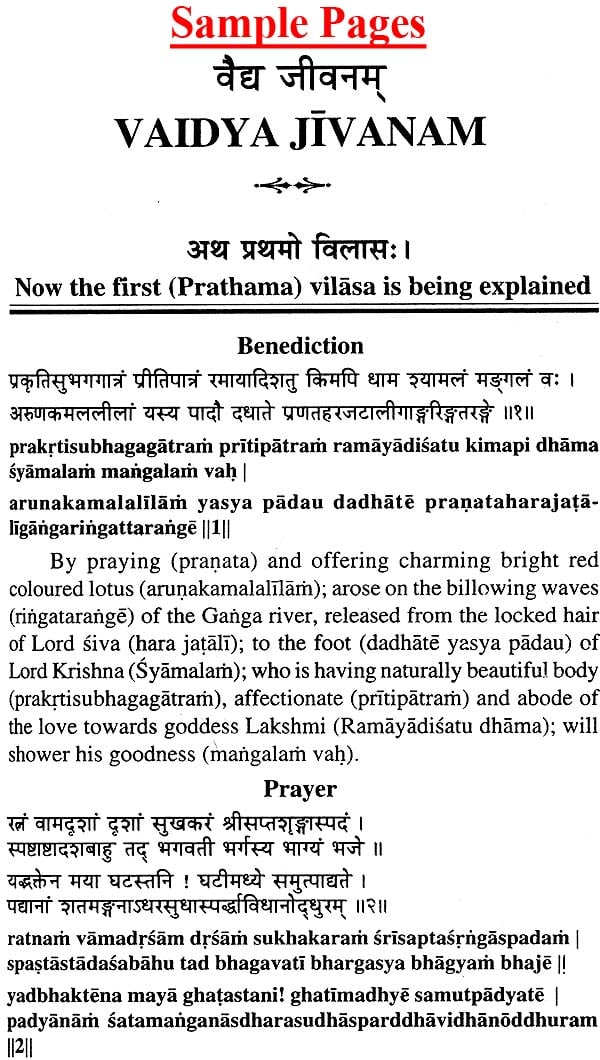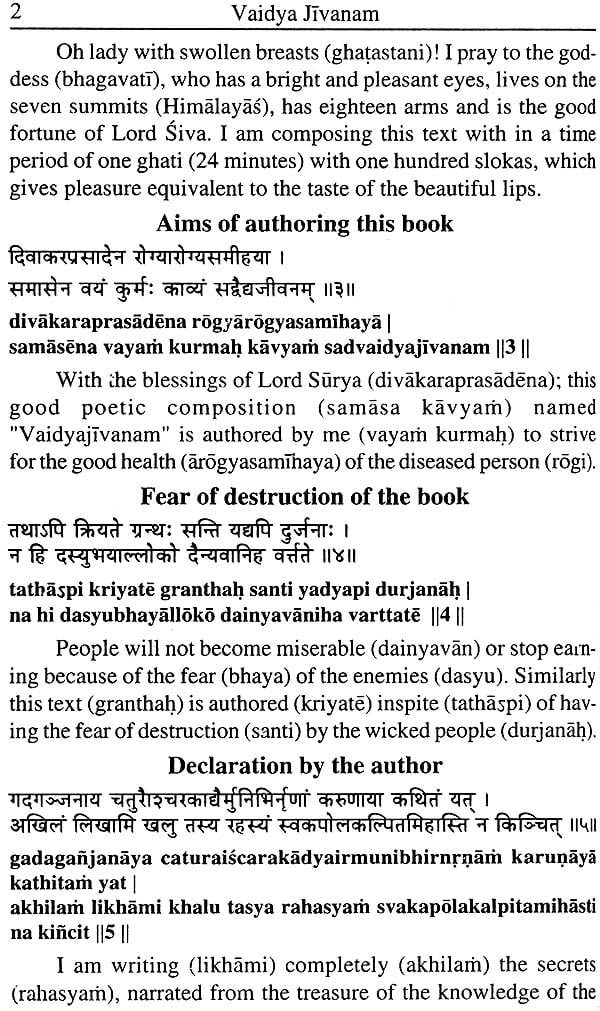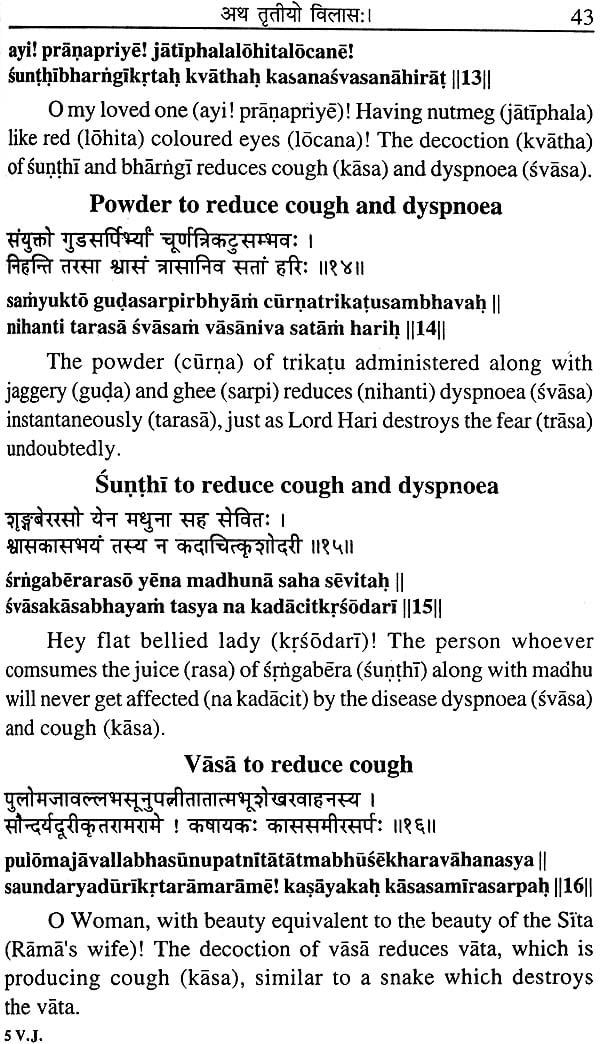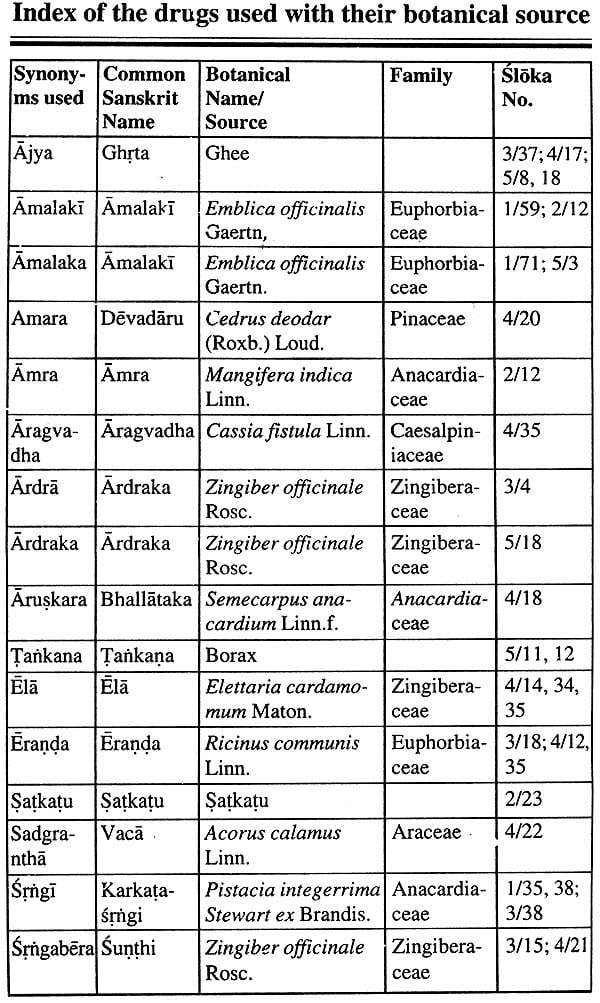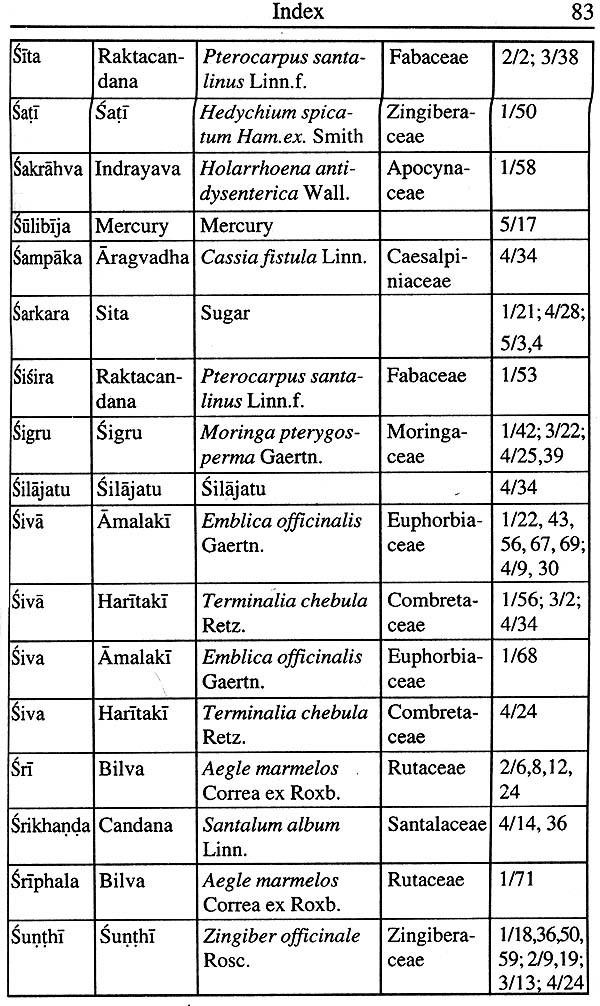
Vaidya Jivanam of Sri Lolambaraja
Book Specification
| Item Code: | NAN797 |
| Author: | Dr. S. Pavan Kumar |
| Publisher: | CHAUKHAMBHA ORIENTALIA, Varanasi |
| Language: | Sanskrit Text With Transliteration and English Translation |
| Edition: | 2017 |
| ISBN: | 9789386660527 |
| Pages: | 124 |
| Cover: | Paperback |
| Other Details | 8.5 inch X 5.5 inch |
| Weight | 150 gm |
Book Description
About the Book
The book Vaidya Jivanam is also called as Sadvaidya Jivana or Lolambarajiyam. It was written by Lolambaraja. Lolarnbaraja is the Son of Diwakara Bhatta. The book is divided into 5 viIasa and is written in the form of conversation between Lolarnbaraja and his wife Murasa. It deals with the preparations related to common diseases like Jvara, Shwasa, Kasa, Atisara, Krimi, Prameha, Vatarakta, Rasayana, Vajikarana etc. Lolambaraja himself have mentioned in the book that the formulations mentioned are from the treasure of the knowledge of Acharya Caraka and other acharyas who narrated them for the benefit of the mankind. Many simple and effective remedies have been mentioned for the various ailments.
About the Author
Dr. Sangu Pavan Kumar is the son of Sri S. Manik Rao and Late Smt. S. Prabhavathi born on 04-06-1976 in Sangareddy, Sangareddy district of Telangana State.
He completed his schooling from Gandhi Centenary High School, Sangareddy in the year 1991. He completed his BAMS (1999) and MD (Dravyaguna) (2003) from Dr. BRKR Government Ayurvedic College, Hyderabad.
He completed his Ph.D. (Dravyaguna) from National Institute of Indian Medical Heritage (NIIMH) Hyderabad under Dr. NTR University of Health Sciences, Vijayawada in 2014.
He has got a teaching experience of 10 years in the subject of Dravyaguna in various colleges of Karnataka, Andhra Pradesh and Telangana. He also worked as Senior Research Fellow at NIIMH, Hyderabad.
He has joined TTD's SV Ayurveda College, Tirupati in the year 2011 and is presently working as Assistant Professor, in the Department of Dravayguna.
The author had a great opportunity to participate in various national and international seminars. He also had the opportunity to be as a Resource person for few CME programs.
He published more than 10 papers in various National and International journals.
He is also the founder member and is associated with journal "International Journal of Ayurvedic Medicine" published by Ayurveda Sahiti Prabha, Hyderabad. He is presently serving as Executive Editor for it.
Preface
This text with name "Vaidyajivanam" is authored by Sri Lolambaraja, He mentions himself to be like Dhanvantari, in relation to the deliberation of the principles of Ayurveda. He also mentioned that he is an expert in the fields of poetry and singing.
Lolambaraja states that this book is a poetic move and aimed at the good health of the diseased person. He also said that this book is narrated from the treasure of the knowledge of the great acharyas like Caraka, Susruta etc. The treatments mentioned this are followed even by the count physicians of that era.
The book is written in the form of the talk between the author Lolambaraja and his wife Murasa. He mentioned very simple preparations for various ailments with easily available drugs.
The book is divided into five vilasa. In the first vilasa, he mentioned 73 slokas related to the treatment of Jvara. In the second vilasa, he mentioned 26 slokas related to the treatment of jvaratisara, atisara and grahani. In the third vilalsa, he mentioned 39 slokas related to the treatment of various diseases like, svasa, kasa, amavata etc. In the fourth vilasa, 43 slokas are mention related to the treatment of ksaya, vrana, etc. In the fifth vilasa, 21 slokas related to vajikarana are explained.
About the translation
With the blessings of almighty and the blessing of all may teachers' the English translation of this book has been taken up to facilitate the easy understanding of the book. The botanical sources of the drugs mentioned are mentioned at the end of the text facilitating the identification of the drugs with the botanical names. The synonyms used for various drugs are also mentioned along with the botanical names. Indexing of the various diseases mentioned is also attached at the end to facilitate easy reference.
Original text of the book is maintained as it is in the devanagari script followed by the same in the diacritical characters. This helps the reader who are uncomfortable with the devanagari script. The translation of the text is mentioned in English and where every proper translation are available, English terms are mentioned. followed by the Sanskrit terminology in the brackets.
Great can has been taken in each and every aspect of the translation to make it the best. But still there may occur many mistakes or controversies which I hope will be excused and may be communicated for further improvization.
Contents
| Benediction | 1 |
| Prayer | 1 |
| Aims of authoring this book | 2 |
| Fear of destruction of the book | 2 |
| Declaration by the author | 2 |
| Causes of depreciation of this book | 3 |
| Characters of an authoritative physician | 3 |
| Sequel of treatment | 4 |
| Avoiding the foolish physicians | 4 |
| Importance of diet | 4 |
| Importance of the book | 4 |
| Pleasantness of the book | 5 |
| Importance of jvara treatment | 5 |
| Decoction for pacana during fever (jvara) | 6 |
| Decoctions for dosa fever (jvara) | 6 |
| Decoction for vata jvara | 6 |
| Decoction for vata jvara | 7 |
| Paficabhadra kasaya | 7 |
| Decoction for pitta jvara | 7 |
| Decoctions for pitta jvara | 8 |
| Decoctions for pitta jvara | 8 |
| Decoction for pitta jvara | 9 |
| Decoctions for pitta vikara | 9 |
| Decoction for jvara | 9 |
| External applications for burning pain | 10 |
| Remedies to reduce burning sensation | 11 |
| Ointments for thirst and burning | 11 |
| Ointment for reducing burning | 11 |
| Some more remedies for fever and burning | 12 |
| Other remedy for pitta jvara | 12 |
| Cold infusion of the dhanyaka | 12 |
| Decoction for fever caused by vayu and pitta | 13 |
| Confection to reduce fever, dyspnoea and cough | 13 |
| Decoction for fever, dyspnoea etc. | 13 |
| Remedies to remove bitterness of mouth | 14 |
| Decoction for cough and dyspnoea | 14 |
| Remedy for reducing tastelessness | 15 |
| Decoction for various ailments | 15 |
| Decoction for various ailments | 15 |
| Decoction for various ailments | 16 |
| Importance of physician | 17 |
| Importance of physician | 17 |
| Remedies for swelling at the base of the ear lohe | 17 |
| Remedies for various ailments | 18 |
| Decoction to reduce jirnajvara | 18 |
| Decoction to reduce jirnajvara | 19 |
| Decocti on to reduce jirna j vara | 19 |
| Decoction to reduce aikahika jvara | 20 |
| Decoction to reduce aikahika jvara | 20 |
| Decoction to reduce trtiyaka jvara | 21 |
| Decoction to reduce caturthika jvara | 21 |
| Treatment for chills | 22 |
| Decoction to reduce sitajvara | 22 |
| Decoction to reduce intermittent fevers (visarnajvara) | 23 |
| Decoction to reduce visamajvara | 23 |
| Rasona kalka to reduce ardita vata and visamajvara | 24 |
| Other remedies for visamajvara | 24 |
| Decoction to reduce visamajvara | 24 |
| Decoction to reduce visarnajvara | 24 |
| Syiimii to treat visamajvara | 25 |
| Other remedies for visamajvara treatment | 25 |
| Decoction to reduce visamajvara instantaneously | 26 |
| Fumigation to reduce fever (jvara) | 26 |
| Decoction to reduce fever instantaneously | 26 |
| Decoction to reduce various ailments | 27 |
| Other remedial measures in fevers | 27 |
| Indication for light food during fever | 29 |
| Decoction to reduce fever and diarrhoea | 29 |
| Decoction to reduce diarrhoea and its associated conditions | 30 |
| Decoction to reduce fever, diarrhoea etc | 30 |
| Importance of pancamula in the treatment of various diarrhoeas | 30 |
| Decoction to reduce sokatisura | 31 |
| Best drugs for diarrhoea | 31 |
| Powder to reduce chronic diarrhoea | 31 |
| Powder to reduce acute diarrhoea | 32 |
| Importance of pippali | 32 |
| Remedies to reduce diarrhoea associated with other conditions | 32 |
| Gangadhara curnam | 33 |
| Decoction to reduce blood mixed stool | 33 |
| Administration of candana | 34 |
| Usage of bilva in the cases of diarrhoea | 34 |
| Importance of praying to God Govinda | 34 |
| Powder for dipana and pacana | 35 |
| Decoction to treat grahani vikara | 35 |
| Decoction to reduce grahani vikara | 35 |
| Decoction for grahani vikara | 36 |
| Candrakala curna | 36 |
| Various other remedies | 37 |
| Various other remedies | 37 |
| Powder to reduce grahani vikara\ | 38 |
| Powder to reduce for grahani vikara | 38 |
| Ghee to reduce grahani vikara | 38 |
| Decoction to reduce cough | 40 |
| Confection to reduce dyspnoea and cough | 40 |
| Confection to reduce dyspnoea and cough | 41 |
| Confection to reduce dyspnoea and cough | 41 |
| Cintamani curna | 41 |
| Powder to reduce dyspnoea | 42 |
| Pills to reduce cough | 42 |
| Importance of nagara in reducing the dyspnoea | 43 |
| Decoction to reduce cough | 43 |
| Powder to reduce cough | 44 |
| Some remedies to reduce dyspnoea | 44 |
| Vibhitaki to reduce cough and dyspnoea | 44 |
| Decoction to reduce cough and dyspnoea | 44 |
| Powder to reduce cough and dyspnoea | 45 |
| Sunthl to reduce cough and dyspnoea | 45 |
| Vasa to reduce cough | 45 |
| Powder to reduce cough | 46 |
| Castor oil to reduce amavata | 46 |
| Decoction to reduce amavata | 46 |
| Treatment to reduce arnavata | 47 |
| Collyrium to reduce eye disorders | 47 |
| Sigru to reduce eye disorders | 48 |
| Preparation to reduce arjuna disorder | 48 |
| Remedies to reduce eye disorders | 49 |
| Collyrium to reduce night blindness | 49 |
| Collyrium to reduce corneal ulceration | 49 |
| Decoction to reduce kamala and panduroga | 50 |
| Devadali phala rasa nasya to reduce kamala | 50 |
| Collyrium to reduce kamala | 50 |
| Cow milk preparation to reduce kamala | 51 |
| Vaginal tablets to reduce pelvic pain | 51 |
| Vaginal paste to reduce pelvic pain | 51 |
| Treatment for the disorders of breast milk (Stanya dusti cikitsa) | 52 |
| Treatment for leucorrhoea (Pradara cikitsa) | 52 |
| Treatment for leucorrhoea (Pradara cikitsa) | 52 |
| Abortifacient preparation | 53 |
| Preparation for easy parturition and pregnancy induced vomiting | 53 |
| Treatments for various conditions during pregnancy | 53 |
| Treatment for childhood diarrhoea | 54 |
| Importance of Simhasya in the treatment of ksaya | 55 |
| Simple remedy for ksaya | 55 |
| Decoction to treat ulceration | 56 |
| Measures to become lean | 56 |
| Treatment of worm infestations | 56 |
| Decoction to control oral cavity ulceration | 57 |
| Decoction to reduce burning sensation in the stomach | 57 |
| Powder to reduce polyuria | 57 |
| Treatment for polyuria | 58 |
| Treatment of vatarakta | 58 |
| Pindatailam | 58 |
| Treatment of visucika | 59 |
| Treatment of thirst and vomitings | 59 |
| Treatment of Hyperhydrosis | 60 |
| Treatment of pama | 60 |
| Treatment for cracked foot | 61 |
| Preparation for various diseases | 61 |
| Treatment of gandamala | 61 |
| Preparations for the disorders of throat | 62 |
| Importance of Sunthi in indigestion | 62 |
| Preparation for various disorders | 63 |
| Preparations to reduce distention of abdomen and increasing of appettite | 64 |
| Decoction to treat internal abscess | 65 |
| Arjuna for the treatment of heart disorders | 65 |
| Bakula for strong tooth | 66 |
| Treatment of cough, dyspnoea and haemorrhagic disorders | 66 |
| Vasa for the treatment of haemorrhagic disorders | 67 |
| Preparation to reduce hiccup | 67 |
| Decoction to reduce giddiness | 67 |
| Alcohol to supress grief | 68 |
| Treatment of iirustambha | 68 |
| Treatment of urinary calculus | 69 |
| Treatment of blackish discolouration of skin | 70 |
| Treatment of different types of rashes | 70 |
| Treatment of swelling of the body | 71 |
| Various treatments for the head and neck disorders | 71 |
| Laghurajamrganka rasa | 72 |
| Other remedies for vata diseases | 72 |
| Decoction to destroy pitta | 73 |
| Decoctions to reduce kapha | 73 |
| Stimulants of sexual desire | 75 |
| Preparation to increase libido | 75 |
| Medicated milk to increase virility | 75 |
| Medicated milk to increase virility | 75 |
| Preparation to increase libido | 76 |
| Preparation to increase libido | 76 |
| Preparation to increase libido | 76 |
| Importance of fast acting drugs | 77 |
| Visvatapaharana rasa | 77 |
| Sitari rasa | 78 |
| Kanaka sundara rasa | 78 |
| Pancamrtaparpati | 79 |
| Vacadi tablets | 80 |
| Vilasinivallabha rasa | 80 |
| Few more conditions and their treatments | 81 |
| Few more conditions and their treatments | 82 |
| Importance of Narayana taila | 82 |
| The author and his pride | 82 |
